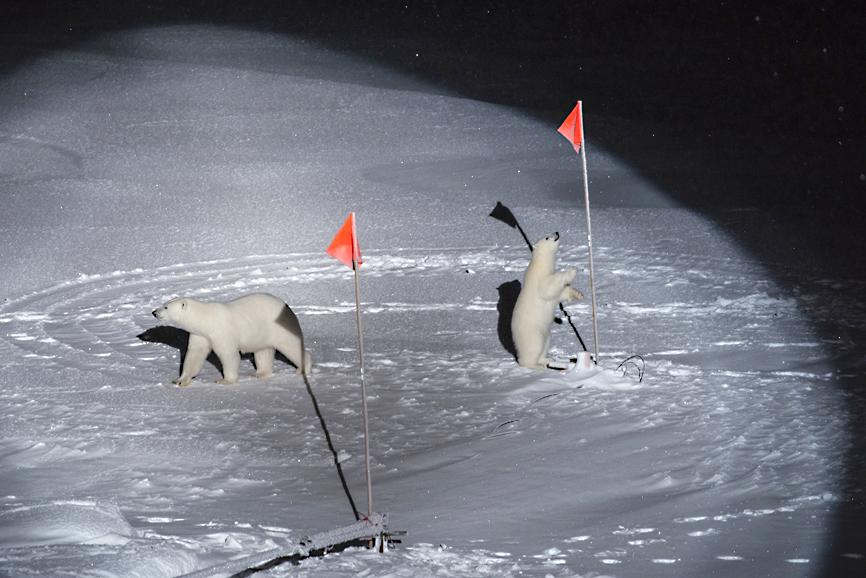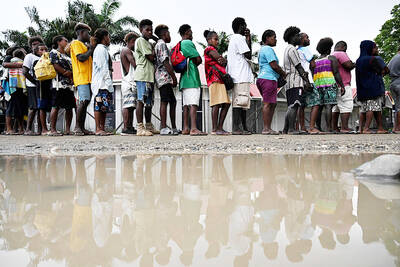The loss of summer sea ice in the Arctic is now very likely before 2050, new research shows, even if the carbon emissions driving the climate crisis are cut rapidly.
The result has alarmed scientists, but they said that slashing greenhouse gases remained vital as this would determine whether Arctic summer ice vanished permanently or could recover over time.
If emissions remain very high, there is a risk that the Arctic could be ice-free even in the dark, cold winter months, a possibility described as “catastrophic.”

Photo: AP
The last global scientific assessment of Arctic ice was in 2013.
It predicted a complete loss of ice in the month of September — when the Arctic reaches its annual minimum — would occur only if carbon dioxide emissions from human activities remained high.
The new results are based on 40 of the latest computer models and is the best assessment to date of the fate of Arctic ice.
Since satellite records began in 1979, summer Arctic ice has lost 40 percent of its area and up to 70 percent of its volume, making it one of the clearest signs of human-caused global heating.
It shrank to its second-lowest extent on record last year.
The loss of the ice exposes the dark ocean, which absorbs more of the sun’s heat and further ramps up temperatures. These changes are also being increasingly linked to more extreme weather including severe winters, deadly summer heatwaves and torrential floods at lower latitudes such as in Europe and the US.
“Alarmingly the models repeatedly show the potential for ice-free summers in the Arctic Ocean before 2050, almost irrespective of the measures taken to mitigate the effects of climate change,” said Ed Blockley, who leads the British Meteorological Office’s polar climate program and was one of the team behind the new research.
“The signal is there in all possible futures,” he said. “This was unexpected and is extremely worrying.”
“If we keep global warming below 2°C, Arctic sea ice will nevertheless likely disappear occasionally in summer even before 2050,” said Dirk Notz, a professor at the University of Hamburg, Germany, who coordinated the analysis. “This really surprised us.”
The new research, published in the journal Geophysical Research Letters, uses the latest generation of climate models from 21 research institutes from around the world.
In climate studies, the Arctic Ocean is said to be ice-free when it shrinks to fragments with a combined area below 1 million square kilometers, which is 75 percent lower than last year.
The models are not perfect and struggle to match closely the ice loss and global warming seen in historical data.
“There is still a lot of uncertainty, but all the models are clear that the sea ice will continue to decline. At some point, it will be gone, but when that happens is still uncertain,” Blockley said.
Sea ice also varies naturally from year to year, making it hard to predict the date of the first ice-free summer.
“There are some models [in which the summer Arctic] goes ice-free in the next few years,” Blockley said.
However, he cautioned that these are considered outliers and that climate scientists use the combined set of models to calculate the likelihood of events.
Another surprising finding from the study is that an ice-free Arctic in the winter months appears possible if carbon dioxide continues to be emitted at high levels.
“That’s not something we’ve seen before in these projections,” Blockley said. “A winter ice-free event would be catastrophic, for some wildlife species [like polar bears] for example, that live and hunt around the sea ice.”
James Screen, a professor at the University of Exeter, UK, said: “It is important to keep in mind that although we might see an ice-free Arctic in all scenarios by 2050, the expected frequency of ice-free summers differs between scenarios. Under a higher emissions scenarios there may be ice-free summers every year, but in lower emissions scenarios they might be occasional.”
Blockley said that the new research showed cutting carbon emissions remained vital to prevent the worst impacts on the Arctic, adding: “We are showing there is still hope.”

SEEKING CHANGE: A hospital worker said she did not vote in previous elections, but ‘now I can see that maybe my vote can change the system and the country’ Voting closed yesterday across the Solomon Islands in the south Pacific nation’s first general election since the government switched diplomatic allegiance from Taiwan to Beijing and struck a secret security pact that has raised fears of the Chinese navy gaining a foothold in the region. The Solomon Islands’ closer relationship with China and a troubled domestic economy weighed on voters’ minds as they cast their ballots. As many as 420,000 registered voters had their say across 50 national seats. For the first time, the national vote also coincided with elections for eight of the 10 local governments. Esther Maeluma cast her vote in the
Nearly half of China’s major cities are suffering “moderate to severe” levels of subsidence, putting millions of people at risk of flooding, especially as sea levels rise, according to a study of nationwide satellite data released yesterday. The authors of the paper, published by the journal Science, found that 45 percent of China’s urban land was sinking faster than 3mm per year, with 16 percent at more than 10mm per year, driven not only by declining water tables, but also the sheer weight of the built environment. With China’s urban population already in excess of 900 million people, “even a small portion

UNSETTLING IMAGES: The scene took place in front of TV crews covering the Trump trial, with a CNN anchor calling it an ‘emotional and unbelievably disturbing moment’ A man who doused himself in an accelerant and set himself on fire outside the courthouse where former US president Donald Trump is on trial has died, police said yesterday. The New York City Police Department (NYPD) said the man was declared dead by staff at an area hospital. The man was in Collect Pond Park at about 1:30pm on Friday when he took out pamphlets espousing conspiracy theories, tossed them around, then doused himself in an accelerant and set himself on fire, officials and witnesses said. A large number of police officers were nearby when it happened. Some officers and bystanders rushed

HYPOCRISY? The Chinese Ministry of Foreign Affairs yesterday asked whether Biden was talking about China or the US when he used the word ‘xenophobic’ US President Joe Biden on Wednesday called for a hike in steel tariffs on China, accusing Beijing of cheating as he spoke at a campaign event in Pennsylvania. Biden accused China of xenophobia, too, in a speech to union members in Pittsburgh. “They’re not competing, they’re cheating. They’re cheating and we’ve seen the damage here in America,” Biden said. Chinese steel companies “don’t need to worry about making a profit because the Chinese government is subsidizing them so heavily,” he said. Biden said he had called for the US Trade Representative to triple the tariff rates for Chinese steel and aluminum if Beijing was